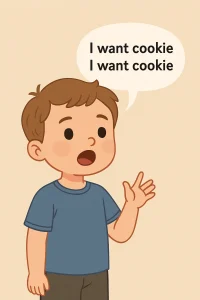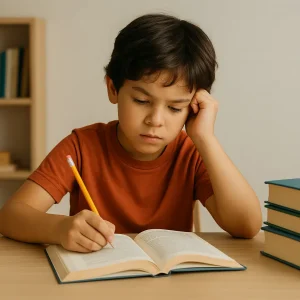Speech and language milestones – 5 to 6 years
By Wellness Hub
Last Updated: November 2, 2023
Are you wondering what speech and language skills your child must be acquiring by the time he or she is in Kindergarten? Children experience vast linguistic growth with refined communication skills during this age range. They master many aspects of language, covering phonological development, polishing grammatical skills, expanding their vocabulary, and improving social communication skills. Let us have a detailed look at the speech and language milestones of a 5 to 6-year-old.
Phonological development
After 5 years of age, there can be significant improvements in phonological development. Children would speak very clearly and pronounce almost all the complex structures. By this age, most of the phonological errors are resolved.
Mastering speech sounds
By 5 to 6 years of age, children exhibit excellent speech skills. Their speech will be intelligent even to unfamiliar listeners. They might have mastered most of the speech sounds in their native language. Children, by this age, would gather a good hold on the complex consonant blends and consonant clusters of their language.
Articulation skills
They can articulate sounds like “r”, “l,” and “th” with increased accuracy. Children of this age group can also articulate consonant blends such as “bl,” “br,” “cl,” and “cr,” demonstrating improved motor control and coordination of their speech muscles.
Proficiency in vowel sounds
Children by 6 years of age would gain mastery over vowel sounds. By this age, they usually articulate long and short vowel sounds accurately. Their speech becomes clearer and mature enough.
Speech intelligibility
By 6 years of age, children’s intelligibility would be so good that even strangers can easily understand what they say. Though there can be some pronunciation errors, they will be less frequent and more refined. Those cute, chubby, unclear words would have a clear diction now.
Expansion of vocabulary
Children around six years of age would acquire most of the basic vocabulary. They acquire knowledge of different words, their synonyms, and antonyms. Children learn the meaning of a wide range of words and try to use them appropriately to the context.
Expressive skills
Expressive vocabulary skills in children find a significant leap during this period. Children around 6 years of age would acquire an expressive vocabulary of around 2000 to 2500 words. They will be able to express a wide variety of ideas clearly with others. They can communicate effectively in various contexts.
Receptive skills
Receptive vocabulary skills refer to the ability to comprehend words. Children around 6 years of age will be able to comprehend instructions by now. They would follow multi-step instructions and also understand a broader range of basic concepts.
Usage of synonyms and antonyms
Around 6 years of age, the children’s vocabulary becomes more refined. They would start using synonyms and antonyms to express themselves. They would also understand and articulate subtle differences in the meaning of words. For example, your child might not accept if you say, “I will give the toy,” instead he or she might insist saying, “Give it now.” They would clearly know the time difference you quote.
Grammatical skills
By the time children reach 6 years of age, there can be observed a lot of improvement in their grammatical skills. The usage of pronouns, adjectives, and verbs, and the formation of sentences and questions, would tell us how good they are at the language and at replicating the meaning of the ideas they have in mind.
Sentence structures
Around this age, your child’s sentence structure would become more complex from those simple structures a couple of years ago. They can now construct correct sentences having proper subject and verb agreement. They will try a variety of sentence types, too.
Usage of pronouns
The way the pronouns are used in a sentence would significantly improve around 6 years of age. Children would be consistently using “I,” “we,” “you,” “they,” “he,” “she,” and “it” appropriately in the sentences they construct.
Verb tenses
By 6 years of age, children would begin the use tenses like past, present, and future more accurately. They will clearly demonstrate an understanding of temporal relationships. They can easily narrate incidents and events in a chronological sequence. If previously, your child used to say, “I want the ball,” he or she would now say, “I want the same ball that I played in the morning”.
Forming questions
Around this age group, children use a variety of question words like who, what, where, when, why, and how. Their question formation becomes more advanced. They question to seek information and also to get engaged in conversations.
Social communication skills
Around 6 years of age, the social communication skills of your child continue to excel. The ability to tell stories, waiting for their turn during conversations, ability to understand jokes and riddles, and the skill to clearly express their emotions and ideas get refined each year.
Narrative skills
By this age, children obtain better story-telling skills. Their narrative skills would be more coherent and those events would have a logical sequence. For example, your child would say, “The cat ran because it was chased by a dog.” Children use different kinds of linking words like “because,” “before,” “then,” “while,” “although,” “when,” etc. to connect the sentences while telling a story.
Turn-taking in conversations
Children by this age group learn to take turns in conversations as they understand the importance of listening to others and waiting for their turn. Their social communication skills improve. They wait for the appropriate moments to discuss something. You can observe this as they look for your mood before asking a favor from you.
Humour and sarcasm
By age 5 to 6, children often grasp humour and sarcasm in their language. They can understand figurative expressions, jokes, riddles, and indirect hints in your conversations. You might be surprised by the way they answer or ignore you for such remarks.
Pragmatic language skills
Around 6 years of age, children would almost have refined pragmatic language skills, including politeness in language and expressions. They become more adept at their expressions and style. They apply their ideas of both verbal and non-verbal expressions according to different social contexts.
Literacy Skills
The literacy skills like reading and writing take a good turn around this age group. Children try to read independently and fluently, sounding out unfamiliar words. They will be able to read short text and minimal illustrations while they try to visualize what they read. You can see your child read hoardings and billboards while you take them out. Their scribbling would become meaningful.
Reading and writing
Many 5 to 6 year olds develop a keen interest in reading and writing. They recognize familiar words. They try to read new words by understanding the sound of the spellings. Children try to learn new words by repeating and rereading them.
Letter and sound recognition
Though formal reading instructions begin later, children of this age group would start recognizing some alphabets and corresponding sounds. They might engage in activities that involve letter identification and basic phonics. By age 6, they try to grasp the sounds of the words and match them with the letters they have in mind to gather their spelling.
Fine motor skills for writing
Around 5 to 6 years of age, the fine motor skills that are necessary to write will be improved, allowing children to hold the writing tools with more precision. The pincer grip will be improved. Children would attempt to draw shapes and letters. They would also engage in early writing activities.
| Receptive language | Expressive language |
| 1. Comprehends quantitative adjective | 1. Uses fluent 5 to 6 word sentences. |
| 2. Comprehends verb number (is, was, are). | 2. Relative clauses are embedded with sentence to add further information |
| 3. Distinguishes between can and cannot. | 3. Relative clauses are embedded with sentences to add further information |
| 4. Improved reading comprehension. | 4. Uses all “wh” questions, “yes/no “ questions, writing. |
By the age 5 to 6 years, you can observe remarkable up-gradation in phonological, grammatical, and social aspects of language development. Around 6 years of age, the ability to articulate speech sounds and to express ideas, to use grammatically correct sentences, and also to engage in meaningful conversations would prove a great step up in their skills. Emerging literacy skills highlight the rich tapestry of language acquisition. With the substantial support of parents, caregivers, and educators, the speech and language milestones of these children are nurtured well.
If you wish to improve their skills or support their learning, it is good to have a speech-learning app. Wellness Hub offers a speech learning app called Speech BASICS that enables children to learn well. The time-framed exercises and activities that are parent-controlled limit the screen time. This way, it benefits the child without getting them addicted. Try it today!
Book your Free Consultation Today
Parent/Caregiver Info:
Client’s Details:
* Error Message








